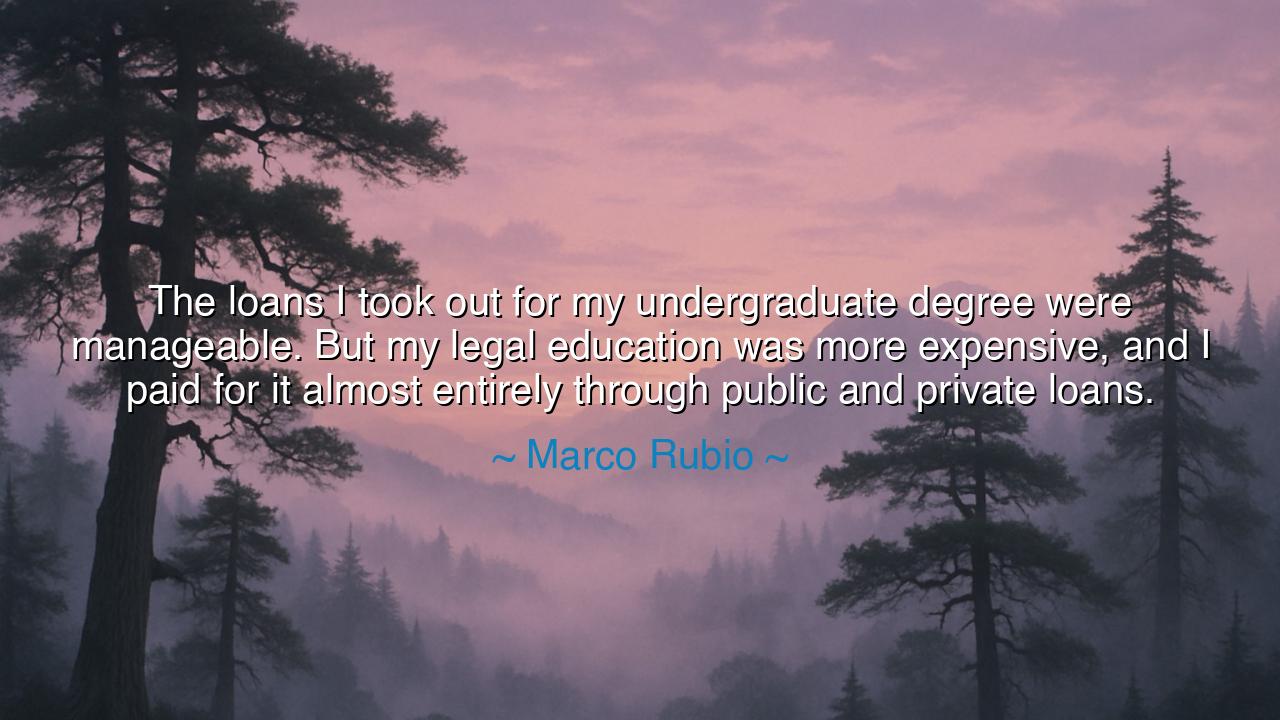
The loans I took out for my undergraduate degree were manageable.
The loans I took out for my undergraduate degree were manageable. But my legal education was more expensive, and I paid for it almost entirely through public and private loans.






Hear the words of Marco Rubio, spoken not as a boast, but as a testimony to the burden borne by many in our time: “The loans I took out for my undergraduate degree were manageable. But my legal education was more expensive, and I paid for it almost entirely through public and private loans.” In this statement lies the struggle of a generation, weighed down not by chains of iron, but by chains of debt—chains that bind not the body, but the future. His confession is not singular, but echoes the voices of countless students who have sought knowledge only to find themselves shackled by its cost.
At the heart of his words lies the truth of education as both opportunity and burden. The undergraduate years, though costly, were a weight he could carry. Yet the higher pursuit of the law, the noble path of justice and advocacy, came with a cost so heavy it demanded the aid of both public and private lenders. What should be the path to freedom and service instead became the gate of indebtedness, turning ambition into obligation. Rubio’s story reveals a paradox of modern times: that education, the very tool meant to lift people into greater service, can become a trap of financial bondage.
History itself offers parallels. In the days of ancient Greece, students often attached themselves to philosophers as apprentices, not paying in coin but in loyalty, service, and discipline. Knowledge was a gift of mentorship. But in our age, knowledge has become a commodity, sold at prices so high that even those who succeed in attaining it find themselves impoverished in spirit, for their labor in early life is consumed in paying back what was borrowed. Thus, Rubio’s words speak not merely of his own experience but of a systemic struggle that defines the modern pursuit of learning.
Consider the story of countless American graduates who, upon leaving their universities, find that their dreams must be delayed. Some forgo public service or noble professions, not because of lack of will, but because their debts demand higher-paying work. A young lawyer, who might have fought for justice for the poor, instead enters corporate halls, not out of greed but out of necessity. In this way, debt reshapes destiny, bending the will of individuals and, through them, the future of society.
The wisdom of Rubio’s words lies not in lament alone, but in illumination. He reminds us that loans, both public and private, are not merely numbers on a ledger, but forces that shape lives. They decide whether one marries early or late, whether one buys a home or remains rootless, whether one serves with freedom or labors under compulsion. They affect not only the borrower but the community, for a society where the young are indebted is a society slowed in growth and dimmed in hope.
The lesson for us is grave yet hopeful: if education is to serve as the ladder of opportunity, it must not also be the weight that drags the climber down. To the leaders, this means reform, the pursuit of systems that allow students to rise without lifelong bondage. To the individuals, this means wisdom in borrowing, courage in sacrifice, and solidarity with those who struggle under similar burdens. For no one should bear the weight alone—families, communities, and nations must walk together in lightening the load.
Therefore, children of tomorrow, take heed of Rubio’s words. Honor education, but do not allow it to become enslavement. Seek knowledge, but also demand justice in how it is provided. Support one another, and remember that true wisdom lies not only in books, but in building a society where learning uplifts without crushing, where ambition is not chained by debt, and where the pursuit of truth does not come at the cost of freedom. In this way, you shall transform loans into legacies, and turn the burden of one generation into the liberation of the next.






AAdministratorAdministrator
Welcome, honored guests. Please leave a comment, we will respond soon